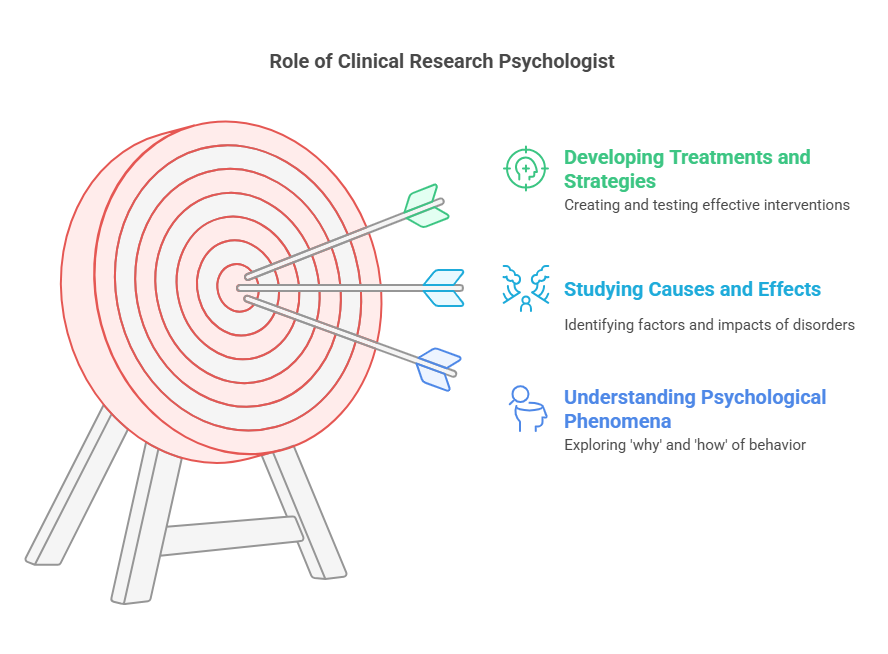What is a Clinical Research Psychologist?
Ever wondered what goes on in the minds of those who study minds? Meet the clinical research psychologist – not your average couch therapist, but the superheroes diving deep into the brain's enigmas. From decoding complex emotional webs to mapping the mysteries of human behavior, these professionals are the unsung heroes of mental health. So, strap in and prepare to explore the fascinating world of clinical research psychology, where science meets the psyche in extraordinary ways!
A clinical research psychologist is a professional who focuses on studying the intricate details of psychological phenomena, specifically the underlying causes, effects, and effective treatments for mental disorders. This field blends rigorous scientific methods with the nuanced understanding of human behavior and mental health to develop better interventions and support systems for individuals suffering from psychological issues.
The Role of a Clinical Research Psychologist
Understanding Psychological Phenomena
Clinical research psychologists delve into the 'why' and 'how' of human behavior and mental processes. They employ various research methodologies, such as experimental designs, longitudinal studies, and case studies, to gather data and insights. Their research might examine the biological, psychological, and social factors that influence mental health, aiming to uncover patterns or triggers that could lead to interventions.
Studying Causes and Effects
One of the primary responsibilities of a clinical research psychologist is to identify the causes of mental disorders. This involves looking at genetic predispositions, environmental influences, and life experiences that could contribute to the development of such conditions. Simultaneously, they study the effects of these disorders on individuals' daily lives, relationships, and overall health. This dual focus helps to create a comprehensive understanding of mental disorders which is critical for developing effective treatments.
Developing Treatments and Strategies
The insights gained from research are directly applied to developing treatment strategies. Clinical research psychologists work on creating and refining psychotherapeutic treatments or interventions that can alleviate symptoms, provide coping mechanisms, and improve the quality of life for those affected. These treatments are rigorously tested through clinical trials to ensure their efficacy and safety before they are widely recommended or adopted.
Work Settings
Clinical research psychologists work in a variety of settings:
Academic Labs: Many clinical research psychologists are affiliated with universities where they teach, supervise students, and conduct research. These labs are often at the forefront of psychological research where new theories and therapies are developed and tested.
Community Centers: These professionals also work within the community, applying their research to real-world settings. They might oversee programs aimed at preventing mental health issues or improving community members' mental wellness.
Healthcare Facilities: In hospitals and mental health clinics, clinical research psychologists might work on applied research that evaluates the effectiveness of different therapy approaches or new medications.
Private Research Institutions: Some psychologists work in private research organizations where they conduct studies funded by private enterprises, often focusing on specific areas like neuropsychology, child psychology, or geriatric psychology.
Impact on Mental Health Care
The work of clinical research psychologists is vital for advancing both the theoretical and practical aspects of mental health care. By understanding mental disorders in depth, these psychologists help shape public health policies, develop better therapeutic methods, and contribute to the overall well-being of society. Their research not only aids in treating current patients but also in preventing future cases through early intervention strategies based on solid scientific evidence.
The Journey to Becoming a Clinical Research Psychologist
The path to becoming a clinical research psychologist is rigorous and comprehensive, involving extensive education, training, and licensure. This journey is designed to equip candidates with the deep knowledge and practical skills needed to conduct meaningful psychological research and, where applicable, provide clinical care.
Educational Requirements
Undergraduate Degree
The first step in becoming a clinical research psychologist is typically earning a bachelor’s degree in psychology or a related field. This foundational stage introduces students to the basic principles of psychology, research methods, and statistical analysis. Students may also begin to explore specific areas of interest through elective courses in subjects like developmental psychology, abnormal psychology, and biopsychology.
Graduate Studies
After completing an undergraduate degree, aspiring clinical research psychologists must undertake graduate studies, typically starting with a master’s degree followed by a doctoral program. There are two main types of doctoral degrees in this field:
Ph.D. (Doctor of Philosophy) in Psychology: This degree tends to focus more on research, including designing studies, analyzing data, and contributing new knowledge to the field. It is ideal for those who are primarily interested in conducting psychological research or teaching at the university level.
Psy.D. (Doctor of Psychology): This degree focuses more on clinical practice, although it still includes significant training in research methodologies. It is tailored for those who intend to practice as clinicians while also engaging in applied research.
Both types of programs involve coursework in advanced psychological theories and methods, extensive training in research design and statistics, and completion of a dissertation based on original research.
Practical Training
Research Experience
Throughout their graduate education, students are expected to engage in research. This hands-on experience is crucial for developing the skills necessary to conduct independent studies and contribute to the scientific community. Students often work in research labs and are involved in ongoing research projects under the supervision of experienced psychologists. This provides practical experience in various aspects of research, including ethics, study design, data collection and analysis, and scientific writing.
Internships and Residencies
In addition to research, doctoral programs in psychology usually require students to complete internships or residencies. These are practical, supervised experiences where students apply their academic knowledge in real-world settings. These opportunities can be particularly important for those pursuing a Psy.D., as they provide direct clinical experience with patients under the supervision of licensed psychologists.
Licensure
Requirements
To practice clinically — that is, to provide patient care — clinical research psychologists must be licensed by the state in which they work. Licensing requirements vary by state but generally include:
Completion of a doctoral degree in psychology from an accredited program.
A minimum number of hours of supervised clinical experience, both pre- and post-doctorate.
Passing a professional examination, typically the Examination for Professional Practice in Psychology (EPPP).
Continuing education to maintain the license.
Purpose of Licensure
Licensure ensures that clinical psychologists meet the minimum standards of competency necessary to diagnose and treat patients, protecting public health and safety. It also legally allows them to provide psychological services independently.
Explore Courses for Clinical Research Career
Courses Available:
Conclusion
As we close this comprehensive exploration into the world of clinical research psychology, remember that organizations like CCRPS are at the forefront of training and certifying professionals who are changing the landscape of mental health through innovative research and application. If you're inspired to make a difference in this vital field, CCRPS offers the resources and training to help you achieve that goal. Be part of the next wave of mental health professionals with CCRPS!
Frequently Asked Questions (FAQs)
-
Clinical research psychologists assess, diagnose, and treat mental health issues, but their primary focus is on researching new understanding and treatments for psychological disorders. They often work in academia, government, or private research organizations.
-
The path involves earning a bachelor's degree in psychology, followed by a master's and a PhD or PsyD. This rigorous educational track equips them with the necessary skills for both research and clinical practice.
-
While clinical psychologists primarily provide patient care, clinical research psychologists focus on researching the underlying mechanisms and treatments of psychological conditions.
-
Current trends include digital mental health interventions, the role of genetics in mental health, and holistic approaches that incorporate an individual’s physical and social environments into treatment plans.



